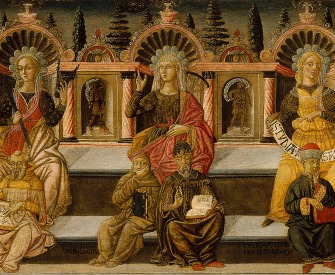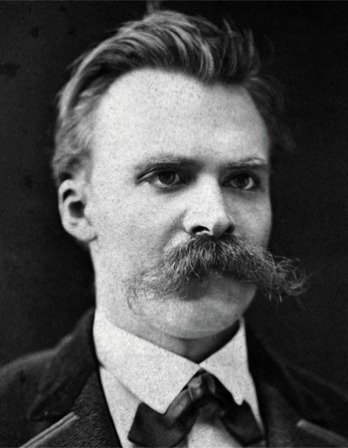It is easier for a camel to go through the eye of a needle, than for a rich man to enter into the kingdom of God.
—The Bible,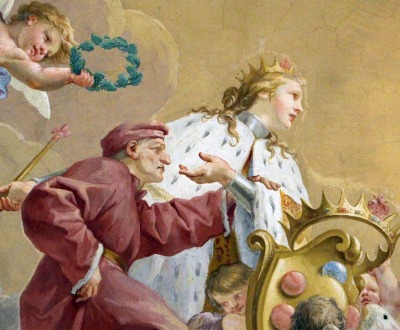
Apotheosis of Cosimo de' Medici the Elder, by Anton Domenico Gabbiani, c. 1698. Villa Medici at Poggio a Caiano, Italy. Image courtesy Sailko.
“With usura,” wrote Ezra Pound:
hath no man a house of good stone
each block cut smooth and well fitting
that design might cover their face.
By usura, Pound meant usury, or the lending of money at an interest—not just an exorbitantly high rate of interest, as in the modern usage of the word usury, but any interest at all. He goes on:
with usura
hath no man a painted paradise on his
church wall…
no picture is made to endure nor to live
with
but it is made to sell and sell quickly
with usura, sin against nature.
In the 1920s, Pound had come to believe, as many still do, that international banking was a source of great evil. He used the Italian word usura because it was in Italy that the story had begun. During the thirteenth and fourteenth centuries, a web of credit was spun out across Europe, northward to London, east as far as Constantinople, west to Barcelona, south to Naples and Cyprus. At the heart of this dark web of usura lay Florence. But in the same period, and above all in the century that followed, the Tuscan city also produced some of the finest painting and architecture the world has ever seen. Never had stone blocks been cut more smoothly, never were finer paradises painted on church walls. Pound, it seems, got it wrong. With usura we have the Renaissance, no less.
Usury alters things. With interest rates, money is no longer a simple and stable metal commodity that just happens to have been chosen as a means of exchange. Projected through time, it multiplies, and this without any toil on the part of the usurer. Everything becomes more fluid. A man can borrow money, buy a loom, sell his wool at a high price, change his station in life. Another man can borrow money, buy the first man’s wool, ship it abroad, and sell it at an even higher price. He moves up the social scale. Or if he is unlucky, or foolish, he is ruined. Meanwhile, the usurer, the banker, grows richer and richer. We can’t even know how rich, because money can be moved and hidden, and gains on financial transactions are hard to trace. It’s pointless to count his sheep and cattle or to measure how much land he owns. Who will make him pay his tithe? Who will make him pay his taxes? Who will persuade him to pay some attention to his soul when life has become so interesting? With usury, things are getting out of hand.
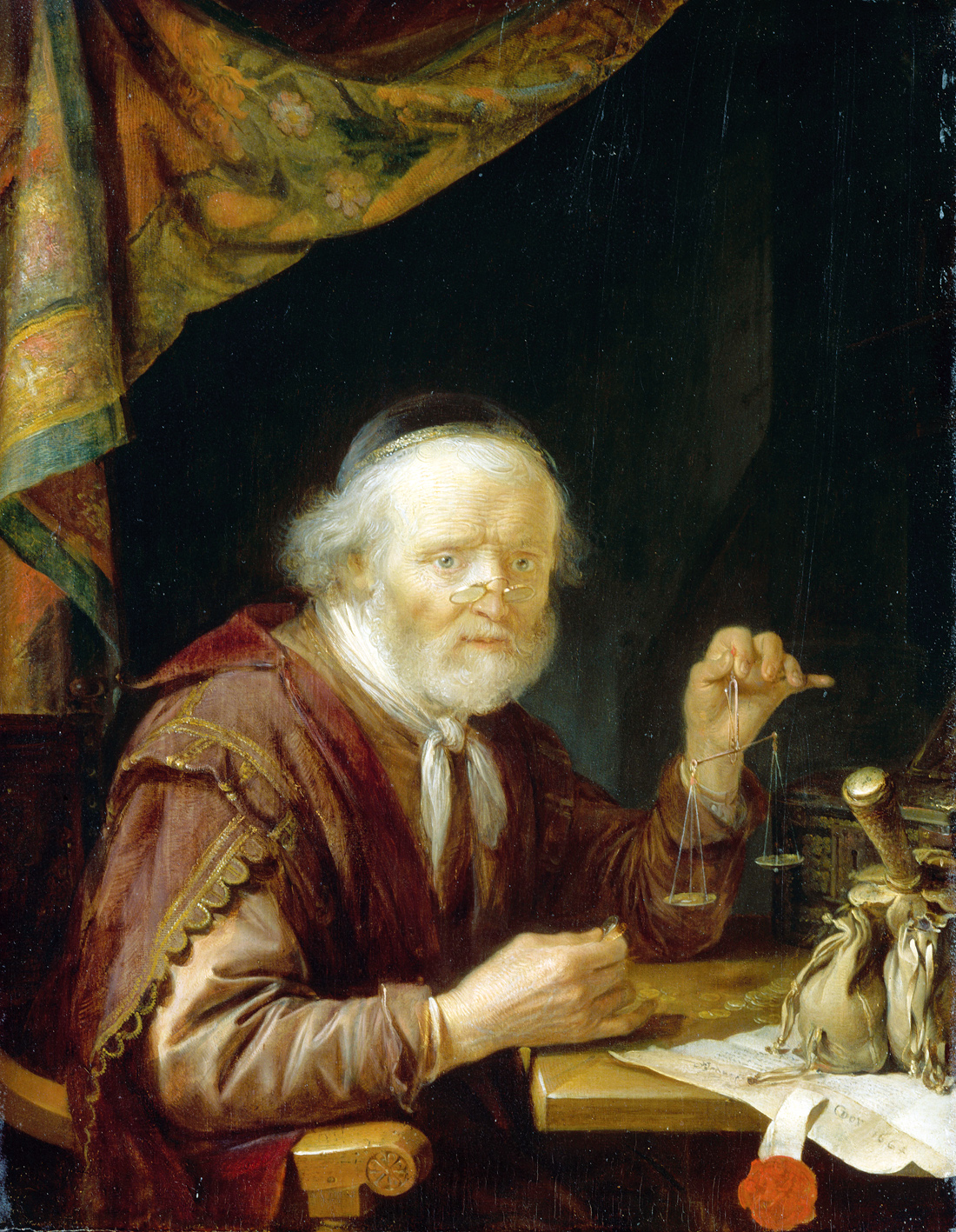
Man Weighing Gold, by Gerrit Dou, 1664. Louvre Museum, Paris.
Contro natura! thunders the Church—against nature. In Dante’s hell, sodomites and usurers are punished in the same place, the third ditch of the seventh circle where flakes of burning ash sift on an unnatural landscape of scorching sand for all eternity. The sodomites are forced to exist (how can we say live?) in an unnatural perpetual motion. The usurers are forced to sit unnaturally still, as they did at their accounts. Only their hands move rapidly and unnaturally, as once they moved counting coins or writing bills that have no currency beyond the grave.
The other inmates of that infernal ditch are the blasphemers; it is unnatural to take the name of your Creator in vain. None of these three sins is considered such today. If a man, today, negotiates a mortgage with a client in the afternoon, has sex with his male lover in the evening, and blurts out, “Christ Almighty!” when the alarm starts him from sleep in the morning, we have no difficulty thinking of him as a decent kind of fellow. Or at least not in the West. In an Islamic state, all three actions are punishable. For the Qur’an will no more permit the lending of money at an interest than it will allow Salman Rushdie to deride the name of Muhammad, or two consenting males to make love. Usury makes money “copulate,” said the theologians, quoting Aristotle. Which is unnatural.
If you still find this concept hard to grasp, you’re in good company. “Go back a little way,” Dante’s pilgrim poet begs his guide Virgil as they hurry through hell, “to where you told me that usury offends God’s goodness, and untie that knot for me.” He can’t quite see it. Summarizing Thomas Aquinas, Virgil explains that, “Nature takes its course from heavenly intellect,” and that, “Human toil, as far as it is able, follows nature, as the pupil does his master, so that it is God’s grandchild, as it were.” In short, God creates work to complete man’s nature. Refusing work—growing rich without moving a finger—the usurer rejects nature, rejects the way God has chosen for him, insults God’s grandchild.
Crucially, then, we must imagine a mind that believes that moral codes are based not on the well-being or otherwise of our fellow man—the poor are not mentioned here—but on metaphysics. The distance between believing that lending at an interest, however low, is always a sin, because it is unnatural, to the modern notion that interest rates are quite normal—but iniquitous when so high that they push a Third World country into poverty—might be one way of measuring the distance between fourteenth-century man and ourselves. That said, however, and granted the good faith of Aquinas and Dante, the sheer violence of the Church’s hostility to usury makes it hard to believe that priests and pope didn’t have some urgent, worldly interest in the matter. One’s “toil,” after all, in the medieval world, meant one’s station in life—miller, knight, butcher, peasant—which was largely fixed from birth. To refuse one’s station was to refuse the fixed order of society in which the Church had a considerable investment and to throw the world into turmoil.
One man who definitely rose above his station and would put his children and grandchildren in a position to rise even higher was Cosimo de’ Medici, whose own father, Giovanni di Bicci de’ Medici, founded the family bank in 1397 and warned his son against the dangers of speculating in politics. In the thirteenth century, the Florentines had kicked out the ancient nobles and introduced a nine-man government elected by lot from among the wealthier property holders. And the government was re-elected every two months. So everybody who was anybody would have a taste of power, briefly, in order that no one should hold it permanently. As a system, this was as unworkable as it was idealistic. Rich men began to use their money to make sure the names they wanted were drawn for the government. Groups of supporters formed around them. Political conflicts developed. Sure enough, in 1433, Cosimo was arrested on a charge of treason. He had tried to rise above his station, buying the support of men in every quarter of the city, presumably with a view to controlling the city’s destiny.
Thanks to the opportunities for bribery that immense wealth brings, Cosimo escaped execution and got away with exile. A year later, when a government favorable to him and much in need of cash invited the banker back, he set about making sure that in the future, the ministers elected by lot would always be friendly. He abolished a law or two that made certain kinds of interest-bearing loans difficult, and he promoted people from the lower classes who would be loyal to him against other members of the city’s ruling oligarchy. So usury not only lifted Cosimo above his station, but others with him. Potentially, it was a social revolution.
Not that the banker was without a sense of guilt. Having “accumulated quite a bit on his conscience,” his biographer Vespasiano tells us, “as most men do who govern states and want to be ahead of the rest,” Cosimo consulted his bank’s client, Pope Eugenius, as to how God might “have mercy on him and preserve him in the enjoyment of his temporal goods.” Spend ten thousand florins restoring the monastery of San Marco, Eugenius replied. It was the first of a long and extremely generous series of renovations and investments in devotional art. Interestingly, Cosimo always made sure that the churchmen to whom he was giving were the purest and poorest, those whose prayers would be worth something up above. And he made sure that these humble ascetics accepted lavish, colorful paintings that a well-to-do Florentine could feel at home with: the three magi with their rich gifts and splendid clothes was a favorite. The Last Judgment was definitely not. In return for his generous donations, Cosimo was granted a papal bull absolving him from all sins, and he had the words of this bull engraved in stone in San Marco. “Never shall I be able to give God enough to set him down in my books as a debtor,” the banker remarked humbly of his huge outlay. Yet clearly that was the kind of relationship he would have preferred. Meantime, condemning usury and fearing the social and political consequences, the Church grew rich from the usurer’s need to buy forgiveness and respectability.
Yet it wasn’t enough for Cosimo to control Florence to be sure of enjoying his wealth, and it wasn’t enough to invest in church art to guarantee himself peace of mind. For Italy was indeed in turmoil and Florence constantly threatened. “No trace is here visible,” writes the great historian Jacob Burckhardt, “of that half religious loyalty by which the legitimate princes of the West were supported; personal popularity is the nearest approach we can find to it. Talent and calculation were the only means of advancement.” But what were talent and calculation without cash? The usurer, the banker, is more dangerous, more powerful, when the traditional structures of society have given way. There is nothing now to obstruct the progress of money. There is nothing more solid and reliable now than the golden florin of Florence, on which, in defiance of ancient hierarchies, no sovereign’s head is stamped, just the name Florentia on one side and the lily, emblem of the city, on the other. With no king on his coins, the banker is more or less obliged to be a kingmaker himself. He funds this or that side or is plundered by them. He either controls the fiscal system or he is taxed out of business. Needless to say, the literature of the time was full of attacks on the “lowborn pleb who rises from the depths to great prosperity.” Could anyone be more callous, wicked, and proud? “A couple of lengths of red cloth,” said Cosimo de’ Medici in one of his wryer moods, “and you have your nobleman.”
With money, you can change your social position, you can have women and go to heaven. This is the contradiction behind so much mental activity in the West. We love money and what we imagine it can do and buy; and at the same time we are haunted by a fear as old as Achilles: surely there must be some value that is beyond buying and selling, something beyond the art of exchange. Oh, but not something, please, that tells us that money is altogether evil, that the plague that took away my child is God’s punishment for my financial transactions. Such is the divided consciousness of the banker in the fourteenth and fifteenth centuries, such the contradiction that over the years will encourage the cultivation of less disturbing and morally demanding non-monetary values—in philosophy, aesthetics, and love.
The real scandal of money, and particularly usury, as we have already said, is that it does not respect traditional hierarchies. The merest artisan can make a fortune and start strutting around in expensive crimson. The feudal order breaks down. But money once made notoriously seeks that which cannot—supposedly—be bought. Perhaps the first generation is happy to have acquired material wealth, but the second yearns for a distinction that is not based on money, a distinction that in the past only birth could give. In the end, the individual—even the richest—resists the idea that his worth is to be quantified in money terms, especially if it wasn’t he who earned the cash. So we come back to Achilles’ conviction, when he refused to accept money in return for his girlfriend Briseide, that human uniqueness has no price, and we arrive at the roots of every snobbery: I wish to be distinguished, but how?
Education is a good place to start. Money buys it, and it then generates a value that goes beyond money. Art achieves the same alchemy. “Money alone,” remarked the wondering Galeazzo Sforza when shown around the art treasures of the Palazzo Medici, “would not be able to compete with what has been done here.” Yet everything had been bought with money. So, ironically, the guilt which prompted the penitential gesture of commissioning devotional art eventually showed the way to a new form of social distinction, based on taste and style rather than cash. And at that point, guilt could be forgotten.
What was the proper education for a rich banker? Giovanni di Bicci had done no more than follow fashion when, at the end of the fourteenth century, he gave Cosimo his humanist tutors. Steeped in Cicero, the young man was seduced by the ideal of the noble leader. He wanted to be such a man. The Florentine constitution, with its system of election by lottery, forbade these ambitions, yet was so weak that, as we’ve seen, it more or less invited a rich man to spend his way to an ambiguous, covert sort of power.
Florence had stripped its feudal nobles of their privileges and didn’t want a return to the past. On the other hand, the expensive education Cosimo was giving his children was breeding aristocratic presumptions. Their life began to resemble that of noblemen. Is it possible, they must have started to wonder, to invent an aristocracy, a new, more sophisticated version of the crude old birthright—not simply and brutally to seize power, but to create, over two or three wealthy and well-read generations, a new hereditary privilege?
The future of Europe for centuries to come would depend on the answer to this question. And that answer, of course, is no. Money and culture do not amount to a divine right to pass on political power to one’s heirs. And yet… if sufficiently enlightened, if supported by effective propaganda, if interminably intermarried with others who had similar pretensions, or who had once been recognized as royal, perhaps the world might be convinced by an expensive parody, an ersatz aristocracy—especially if, at the end of the day and in the teeth of the evidence, the people enjoying the privileges were always willing to declare themselves ordinary citizens.
A key element in the process that transformed the usurer of the fourteenth century into the ersatz aristocrat exemplified by Cosimo’s grandson Lorenzo the Magnificent in the late fifteenth was the rise of Platonism. Under Cosimo’s protection—a house and a salary—Marsilio Ficino translated the entire works of Plato into Latin in the 1460s. It was the first time they had all appeared in a form Western Christendom could read. Later to become a priest, Ficino added his own personal but crucial twist to Christian Platonism: the human soul, he decided, was “the center of nature,” the connecting link between the hierarchies of Platonic reality that placed inanimate material at the bottom and a world of ideal forms at the top. Through love and intellect, Ficino thought the human soul naturally strives upward, away from what is base and earthly, through the hierarchy to the pure light of perfect eternity, God.
Discussed by Florence’s best minds while celebrating Plato’s birthday every November 7 at the Medici villa at Careggi, such ideas came at exactly the right moment for the process of upward social transformation in which the Medici were involved. Apart from giving a new sense to courtly love poetry (the mind moving from profane to divine love), all education, refinement, and intellectual achievement could now be understood as essentially moral, involved in a process of striving toward the Divine. Certain secular activities, that is, could be imagined as partaking of the sacred, or at least as turned toward the sacred. Nothing good (and the dangerous implication is that we know instinctively what is good) was outside the Christian framework, at which point art and poetry need no longer turn so constantly to strictly Christian subject matter, because beauty itself is close to divinity and the human soul naturally leans toward it. Creativity, which is of God, is not, in this new and optimistic version of Platonism, denied to man, though few achieve it. But when achieved, it is essentially good. Even today, there are many who believe that art is necessarily on the right side and do not ask which bank sponsored it. Sponsored by Medici money, Botticelli can now use the same pretty model for a Madonna or for Venus. He can leave the lady’s clothes on or he can lift them off. Either way, the mind is being lifted spiritually. At this point, the gesture of penance implicit in almost all Cosimo’s patronage of the arts can be safely and happily forgotten. Art is always sacred. The rich banker has found a way of claiming a distinction that is not merely monetary, but without now admitting a humiliating sin. Penitence has morphed into taste.
But to dig a little deeper at what wasn’t explicitly stated or perhaps even consciously meant, yet nevertheless seeps through: the process of raising yourself up, of becoming this refined, educated, artistic aristocrat was now no longer an evil thrusting above and beyond your proper medieval station. On the contrary, it was a sign of your upward aspiration toward the Divine. This was an attractive and soothing thought. It would galvanize Lorenzo into sponsoring, and himself engaging in, a range of lavish, public artistic projects, mainly secular, which were at once beautiful and politically convenient, in that they enhanced the city’s image and his own. A leader who sponsors and, as a poet, actually creates beautiful art cannot be a bad leader. A leader who employs the likes of Botticelli to make festival banners and carnival floats will not get a bad press from posterity. And the good citizen, the good Christian, must be a Platonist because only the Platonist appreciates and participates in this striving for the beautiful and better, this aestheticizing of public life. If he wasn’t a Platonist, that is, our philistine citizen might merely start counting the florins and making dry remarks about political self-interest.
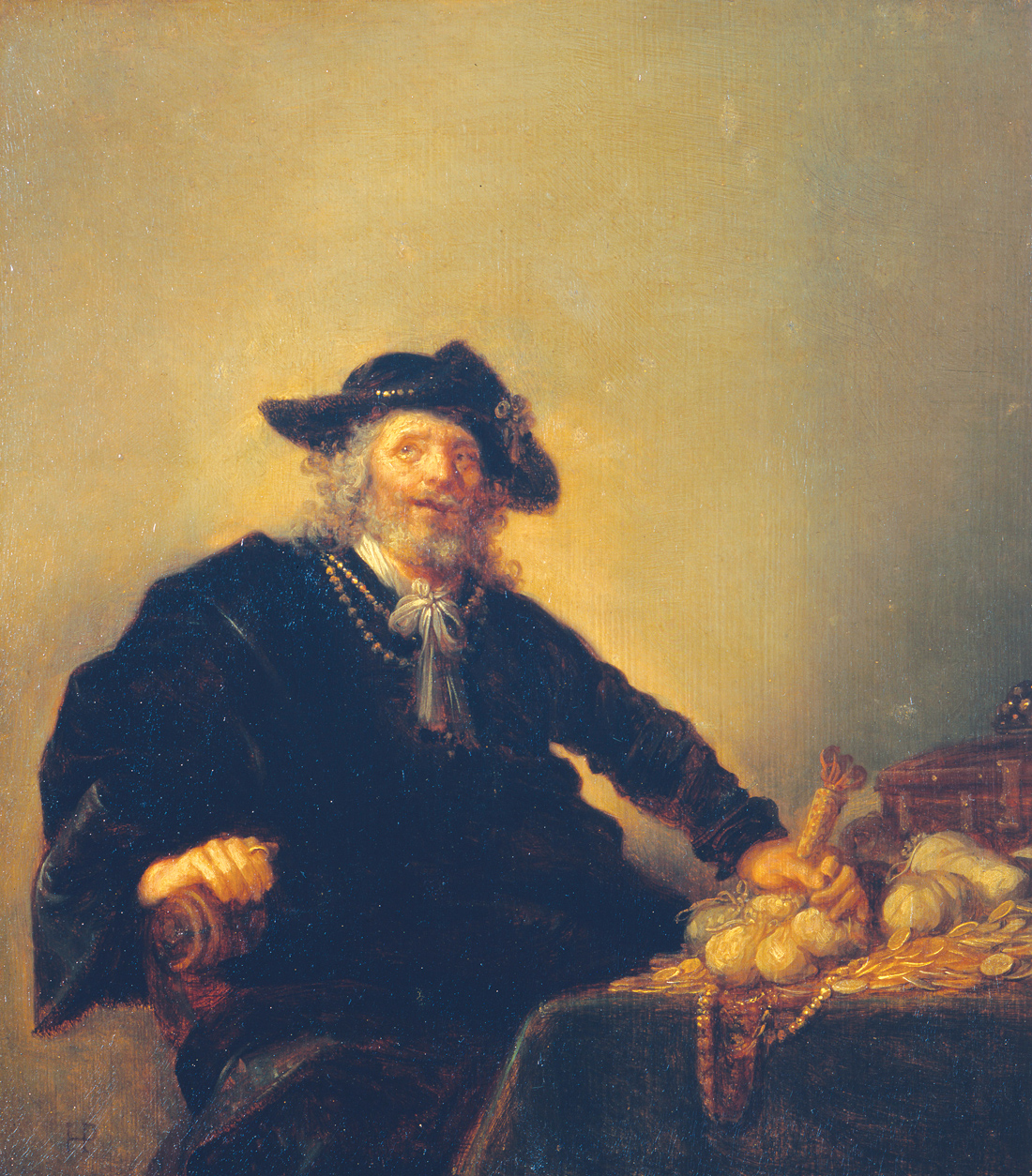
The Miser, by Hendrik Gerritsz Pot, c. 1640. Uffizi Gallery, Florence, Italy.
Which brings us to the chief drawback of these exciting ideas: they had little to say about moneymaking and the price of things. The underlying contradiction here is quite different from Cosimo’s dilemma: how do I get my soul to heaven while amassing a fortune with supposedly sinful banking practices? The problem now is that while wealth is actually more important than ever—for how else can you get the best artists to paint for you, the best teachers for your children, a decent translation of Plato, and the wherewithal to throw a lavish party for a dead philosopher’s birthday?—nevertheless, the actual process of moneymaking is passed over as something base, something on the lowest level of the Platonic hierarchy, something the nobler soul would gladly leave behind in its struggle to be free from mere matter.
To this frame of mind, then, the complexities of accountancy, the intricate technicalities by which the sin of usury can be avoided are no longer things to dwell on with pleasure, as Cosimo doubtless did dwell on them—Cosimo, who said he would be a banker even if money could be made by waving a wand. No, now the cultured man, grandson of the banker, wants to wave whatever wand comes to hand and get the problem of a good income out of the way as soon as possible: by lending money to the duke of Milan at the highest possible rate of interest, for example; by getting the concession to collect import duties at key customs posts; or, most dramatically, in the case of the Medici bank, by the attempt to establish a monopoly in the mining and commerce of alum, a mineral essential to the wool trade and hence one of the most valuable raw materials of the time.
All of these ambitious projects failed drastically. The huge fortune that Cosimo built up in the first half of the fifteenth century was squandered in the second half, to the point that Lorenzo frequently had to hijack public funds to keep the business afloat. Rather than a banker muscling his way into political power, he was now a politician with his hands in the public coffers. But other Florentine banks declined too. This new generation of men were no longer interested in money, except to spend. And since spending, unlike usury or rising above one’s station, was hardly a sin, all the moral tension that had animated Cosimo and made his religious art commissions so fascinating and ambiguous in their genuine devotion and simultaneous eagerness to legitimize wealth and show it off, was also gone. The High Renaissance came at exactly the moment when usury was felt to be most sinful, yet was most diligently and anxiously practiced. After which, Michelangelo ushered in the mannerism and monumental magnificence that would characterize the vainglorious dynasties of the later Medici, men who declared themselves dukes rather than bankers—grand dukes even—men who understood art first and foremost as a propaganda tool, and who did everything they could to have their subjects forget that their power originated in the minds of two or three clever ancestors who had known how to make money copulate despite the Church’s prohibition.

